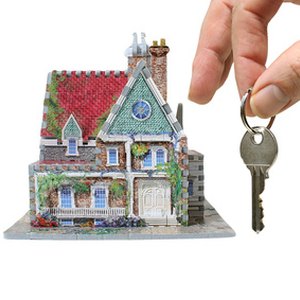
Although usually a mortgage loan is the best approach to financing a home, there are situations in which it might not be. For example, if you have a high-risk variable-rate mortgage, you might choose to pay off your mortgage with a reasonable fixed-rate personal loan. Paying off your mortgage with a personal loan generally is recommended only if it will result in a lower interest rate, thereby saving you money over time.
Determine how much you have left to pay on your mortgage. Ask your mortgage lender if you will have to pay a penalty for paying off your mortgage early; if so, add any penalty payments to your mortgage payoff total.
Locate a bank or other lender. Usually you get a personal loan from a bank, but if you have a wealthy family member or friend, you could ask him about giving you a personal loan, especially if your credit score does not qualify you for a traditional bank loan. Research interest rates, and choose the lender that offers the lowest interest rate.
Request a loan application from the bank, and fill it out completely. Read all terms and conditions of the loan, and ask the lender to explain anything you don't understand. If you are borrowing from an individual, put the terms of your agreement in writing, including the amount of the loan, terms for repayment and any interest rate that applies.
When you receive the proceeds from your personal loan, deposit the check in the bank. When it clears, write a check on your account to your mortgage lender for the full payoff amount of your mortgage.
References
- Federal Housing Finance Agency. "FHFA Announces Maximum Conforming Loan Limits for 2020." Accessed Mar. 10, 2020.
- Consumer Financial Protection Bureau. "What Is a Jumbo Loan?" Accessed Mar. 10, 2020.
- U.S. Department of Housing and Urban Development. "Let FHA Loans Help You." Accessed Mar. 10, 2020.
- Office of Public and Intergovernmental Affairs. "Federal Benefits for Veterans, Dependents and Survivors." Accessed Mar. 10, 2020.
- Consumer Financial Protection Bureau. "Seven Factors That Determine Your Mortgage Interest Rate." Accessed Mar. 10, 2020.
- Consumer Financial Protection Bureau. "What Is a Loan-to-Value Ratio and How Does It Relate to My Costs?" Accessed Mar. 10, 2020.
- National Credit Union Administration. "Homeowners Protection Act (PMI Cancellation Act)." Accessed Mar. 10, 2020.
- Federal Reserve Bank of St. Louis Review. "A Primer on the Mortgage Market and Mortgage Finance," Page 37. Accessed Mar. 10, 2020.
- Consumer Financial Protection Bureau. "With an Adjustable-Rate Mortgage (ARM), What Are Rate Caps and How Do They Work?" Accessed Mar. 10, 2020.
Writer Bio
Krystal Wascher has been writing online content since 2008. She received her Bachelor of Arts in political science and philosophy from Thiel College and a Juris Doctor from Duquesne University School of Law. She was admitted to the Pennsylvania Bar in 2009.

